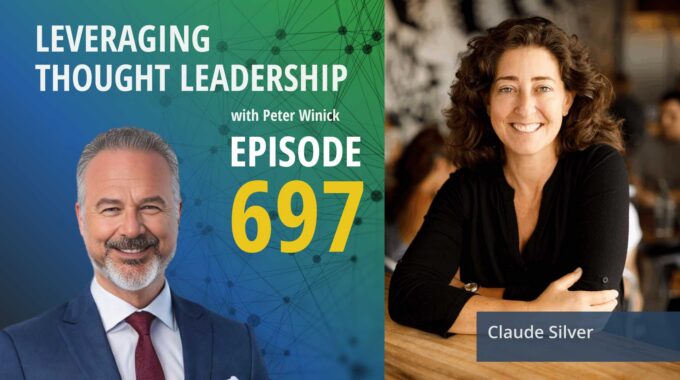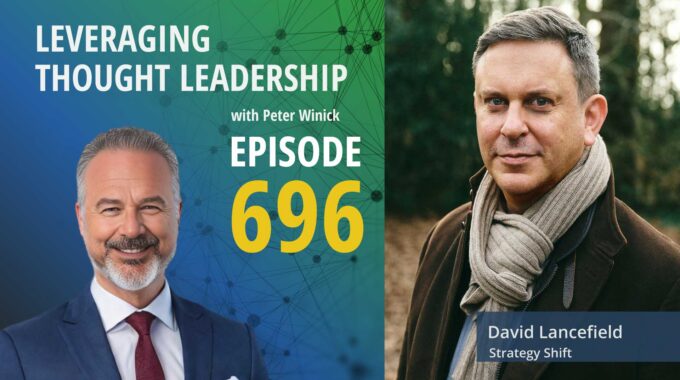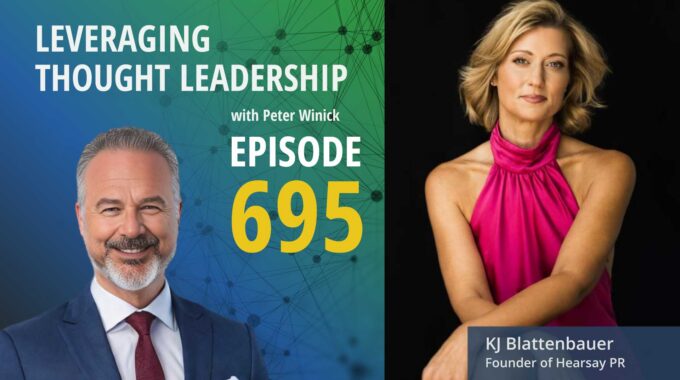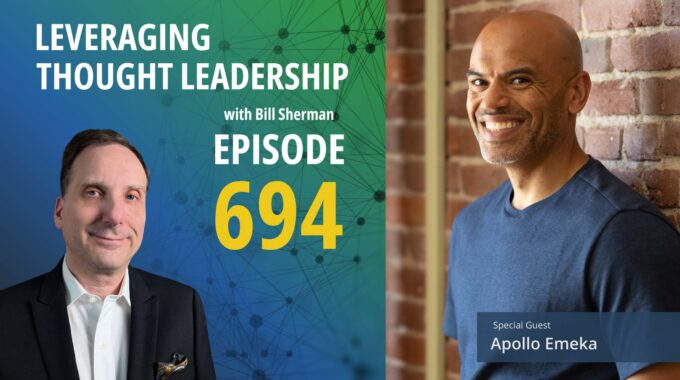Frameworks for connection, accountability, and performance This episode examines how psychological safety drives performance, how…
The Effective Founder’s Blueprint | Martin Gonzalez
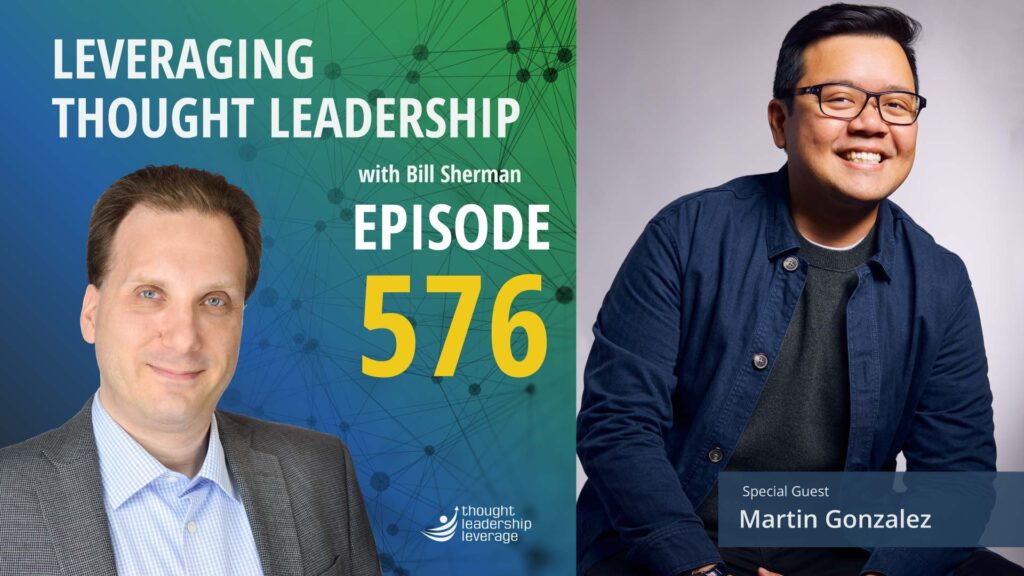
Understanding Why Founders Succeed or Fail
A conversation with Martin Gonzalez on using comprehensive data to guide early-stage companies to greater success.
In this riveting episode of the Thought Leadership Leverage podcast, host Bill Sherman engages with Martin Gonzalez, the co-author of the best-selling book “The Bonfire Moment” and the visionary behind Google’s “The Effective Founders Project.” Dive into the fascinating journey of Martin, who transformed a personal passion into a global initiative that has reshaped the landscape of startup success.
Martin Gonzalez’s journey at Google began a decade ago at their Singapore campus. Embracing Google’s culture of innovation and autonomy, Martin seized the opportunity to embark on a passion project that aligned with Google’s business goals. His fascination with startup founders and the early stages of company development led him to partner with Joshua Yellin, who was leading Google’s Startup Accelerator Program. This program, with its focus on machine learning, globalization, and growth hacking, provided a fertile ground for Martin’s innovative ideas, despite his initial lack of expertise in these areas.
Martin’s breakthrough came when he uncovered a Harvard study indicating that 65% of startups fail due to people issues. Armed with this insight, he proposed a two-day workshop aimed at addressing these challenges. The workshop, first tested in Jakarta and then in Bangalore, received overwhelmingly positive feedback. Their success was not a one-time anomaly; the workshops continued to garner high ratings worldwide, eventually impacting founders across 70 countries.
In this episode, Bill and Martin explore the journey of understanding why startups succeed or fail. Martin highlights the pitfalls of relying solely on data from successful founders, which often leads to “Survivor’s Bias.” He stresses the importance of comprehensive data that includes insights from failed ventures to paint a realistic picture of startup dynamics.
Martin also shares the genesis of their book “The Bonfire Moment.” Initially hesitant to commit to writing, Martin was eventually convinced by Joshua Yellin, who saw the immense value their workshops offered. The book became a natural extension of their workshops, providing an open-source toolkit for startup founders. This approach, rooted in Google’s ethos of sharing and collaboration, aimed to empower others with the tools and knowledge to replicate their success.
The conversation also touches on Martin’s unique role as an “Enlightened Practitioner.” He bridges the gap between academic research and practical application, translating complex research findings into actionable insights for leaders and managers. This ability to synthesize and communicate evidence-based advice makes Martin a pivotal figure in the startup ecosystem.
The episode concludes with a discussion on the development of a validated measure for assessing founders. Through years of collecting 360-degree feedback surveys and analyzing thousands of data points, Martin and his team published the “Effective Founders Report.” This report, which garnered significant attention from their publisher, laid the foundation for their influential book.
Join Bill Sherman and Martin Gonzalez for an illuminating discussion on the intricacies of startup success, the power of data-driven insights, and the transformative potential of open-source tools. This episode is a must-listen for thought leaders, authors, and speakers who are passionate about innovation and leadership in the startup world.
Three Key Takeaways:
Addressing People Issues is Crucial for Startup Success: Martin Gonzalez’s research, backed by a Harvard study, revealed that 65% of startups fail due to people-related issues. His workshops focused on these challenges, demonstrating that addressing team dynamics and leadership is essential for early-stage companies to thrive.
Importance of Comprehensive Data to Avoid Survivor’s Bias: Martin and Bill discuss the pitfalls of relying solely on data from successful startups, which can lead to “Survivor’s Bias.” Understanding why startups fail is equally important to gain a realistic and holistic view of what contributes to success or failure in the startup ecosystem.
Open-Source Approach to Knowledge Sharing: Reflecting Google’s ethos, Martin and his co-author Joshua Yellin chose to make their workshop tools and insights freely available through their book “The Bonfire Moment.” This open-source approach aims to empower a broader audience, emphasizing mission and reach over profit, and fostering a collaborative environment for startup growth.
If you want to read more about what it takes to Build Awesome Assessments check out this article by Bill Sherman.
Transcript
Bill Sherman Nine years ago, a workshop session in Jakarta asked the surprisingly simple question well, what makes boundaries effective? And that question has evolved into a global program, a major research project, and now a published book. Today I speak with Martin Gonzalez. He’s the author of The Bonfire Moment and the creator of Google’s Effective Founders Program. In today’s conversation, I’m going to explore how an interesting idea for a workshop became something much more substantial when it uncovered a significant gap in the research literature. So let’s continue our investigation of the academic and practitioner divide so that we can bring good ideas to the people who need them most. In today’s episode, I’m eager to talk with Martin about the origin story for the research, the impact it has made so far for founders across the globe, and where he hopes these ideas will spread. Next, we’ll also explore some really amazing choices around the structure of the book and the workshop itself. I’m Bill Sherman and this is the Leveraging Thought Leadership podcast. Ready? Let’s begin. Welcome to the show, Martin.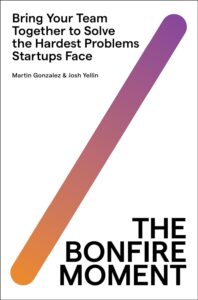
Martin Gonzalez Thanks for having me, Bill.
Bill Sherman So I’m excited to dive into this because there are several pieces here. And maybe the first place to start is around how a Google 20% project evolved into thought leadership. So give me a sense of where was the starting seed for this as a 20% project?
Martin Gonzalez Yeah. So I joined Google about ten years ago in our Singapore campus. And. You know, I’m told, as I come in this magical culture that Google has created, one part of it is that they give people a chance to engage in a passion project that somehow was connected to Google’s business. And at this point, I am fascinated by startup founders because I am convinced and convicted at this point that if I were to impact the world in a positive way, in the largest way possible, it would be to do it as early in the life stage of a company. Because if you can set it up well, then then it kind of help, you know, guarantees a more positive trajectory. Not always, but it somewhat guarantees. So I reach out to Josh, my coauthor, who is based in the US at that point and raised my hand to volunteer some time to help. What he was he was building then the Google for startups accelerator program, and a lot of what they were offering in that program were things around machine learning and, you know, internationalization, growth hacking, etc. kind of the classic set of topics in an accelerator program. And I said, okay, but, you know, I don’t have any expertise in those areas. But at that point I was working. At Google’s learning and development function, doing a lot of this work for internal leaders. I said, you know, let me let me look at what the research shows. And lo and behold, I find there’s this classic study out of Harvard that asks VCs like, think of the your portfolio and the companies that had failed in your portfolio recently, and what were the top reasons for failure. And the number one reason, by far, 65% of startups failed because of because of people issues. So I ran up a quick proposal. I send this to Josh, I’m like, give me some money. We’ll pilot something simple. And so we create. At that time, we created a two day workshop, run it in Jakarta, and somehow it receives like the highest rating of all the different parts of the accelerator program. And so then we’re like, okay, great. But surely there was an anomaly here. Let’s try it again. Bring it to Bangalore again. The same reception like this is so useful. Thank you. The most useful part of what already was a fairly, you know, incredible accelerator experience. And then it gets brought to Sao Paulo. We bring it to Lagos, we bring it to Warsaw. And anyway, today it’s reached founders in about 70 countries. And at some point early on, I was the one who was bringing the programs. But at some point we had to then train up facilitators. At some point, I was able to then do a lot more of the analytics on a lot of the data we would collect on founders and, you know, and then later on do some partnerships with Wharton to validate some of that. So it kind of somehow it bloomed from that very humble early, early kind of thought of, let’s just try something.
Bill Sherman So I want to go back to something that you said. You went to the literature and said, okay, why do VCs stay? Startups fail 65%, right? Yeah. Now, a reasonable next assumption would be there’s a lot of research done into well, why does this happen? Right. Yeah. In and details. You would assume there’s a fertile field out there. Yeah. I assume you did pretty soon either in building that first workshop or soon after. I’ll look at, you know, what the literature said next click. Yeah. Was there all it.
Martin Gonzalez But well so it’s interesting you say that. So there were a few really seminal pieces during that time that we leaned on that were academic and then kind of more practitioner oriented in nature, but there wasn’t anything that really honed in on like, what specifically do founders at that very early stage during these hypergrowth periods, like, what do they need to be doing kind of as leaders as they build the company, as they build a team around the product? In fact, one of the people we had reached out to was Linda Greer, who was then at Stanford Business School. And I come to her with this question of like, okay, we’re building out this very kind of no frills program. I would love to at least grounded in some research. And at that time, she was teaching a course at Stanford called The Psychology of Startup Teams. I thought, okay, great. There must be an answer here.
Bill Sherman Right?
Martin Gonzalez As one.
Bill Sherman But there’s an entire, you know, place devoted to that within that course.
Martin Gonzalez Right? That’s right. And so I ask her, so if I were to ask you to summarize what the traits should be or what the behavior should be of effective founders, like, what is that list? And, and she kind of says, well, you know, it’s an early field. There really isn’t much that’s been studied. But here’s kind of what I teach in the course. And I look at but she sends over the deck and I look at the deck and, I think it’s based off a Forbes article that’s like a listicle of like top eight things or ten things that you should be doing as founders and look like no job. And like, I think that’s how that’s how early fields operate. Right? It’s let’s take our best guess. Let’s put it out there and, you know, let’s kind of gather reactions, spur on your research. So essentially, there was really not a lot to lean on. And so it felt like, wow, we should maybe more seriously like go about the work of, you know, assessing founders and then validating that assessment tool, which is exactly kind of what we do over time with this program because we run a 360 degree feedback survey, you know, with the founders in these programs.
Bill Sherman Well, and there’s a couple things that pop out from the Forbes article and listicle. Right. And like you, often someone puts a sort of the early footpath down and then someone says, well, how would we test this? Yeah. How do we measure what are the even the hypotheses and brings rigor to something that we’re, you know, a smart person has sat down and said, you know, I saw a pattern. I’m just going to create a listicle. I think listicles are a great way for spawning ideas, but there’s this tension between the absence in the academic literature and one article in Forbes. It wasn’t even in the pop literature.
Martin Gonzalez Yeah. And you know so. So the first thing to say is I think the jury’s still out. I won’t say that. Well, my work therefore, you know, answered the question. I think there is the.
Bill Sherman Next step on the journey. And you’re going to spin off other research hypotheses.
Martin Gonzalez Right? Right. And so, you know, everything begins with descriptive analysis. Right. Like what do we see and how do we describe what we see. And then you can go on and do more correlational analysis, which is stuff that I do and I do with a, collaborate, collaborator, Valentina Casanova from Wharton, where you now correlate this with real startup outcomes, like do, do startups fail, do startups get to go to IPO? And so we can’t. But at some point you want to then go to the I guess the gold standard, which is let’s do experimental stuff. Let’s run a, you know, let’s, let’s kind of run a control group, experimental group. And, you know, each of these steps of kind of building thought leadership has its own challenges. Right? So at the very beginning, these listicles, they do suffer from survivor bias, which is usually the writer of this. We’ll look at successful founders and then conclude that what they see that they do, or what they claim that they do is the formula for success. Well, unfortunately for that to be really true, you’d have to check kind of if the people who failed did the same and failed anyway. And that’s kind of what we tried to do with the data we had, which is we looked at, you know, the best and the least effective, put them under a microscope and try to see what was different between those two cohorts.
Bill Sherman Well, and in addition to survivor bias, there’s also probably a file drawer problem of people who have collected data that might be relevant but has either never been published or yeah, it’s buried in a way that you don’t realize the existing pieces out there. Right? So some of what you’re doing is putting a spotlight on the research question and saying, hey, we’d love to engage with other people who may have had an idea either anecdotal, anecdotally at a data where or actually a full data set. Right.
Martin Gonzalez I agree. And, you know, through the years I’ve learned. So one is I’ve learned to instead of asking the question on google.com, I’ll ask the question in Google Scholar, then yes. Then you come, you at least you unearth some of what’s been done. But recently I’ve been doing the search on SSL, which is kind of a, a database of papers that are that have not yet been published but are kind of in the review process. Then you start to see, like some of the early thinking, and especially now in this moment where there’s a lot of energy around generative AI and there’s a lot of research going on, but for you to actually know what’s going on, etc., and seems to be a really good place to, to start because, you know, the review cycles in these peer reviewed journals, while really robust. Wow. It takes forever. It takes years.
Bill Sherman Well, and you have a replication study problem in the fields with psychology and being able to say, hey, let’s have an agreement that here’s the study, regardless of what’s going to come out of the study, let’s publish it. Right. And so there’s this tension that really exists. I want to go back to a conversation that you alluded to with your coauthor, Josh. And, you know, you’re getting momentum for this workshop. I think you said Josh started asking you a question about the book.
Martin Gonzalez If I. Yeah. So, it’s funny because he didn’t see the first, the first pilot in Jakarta, but he did see the pilot in Bangalore, the second, one that we ran. And I remember very distinctly over dinner after we had wrapped up the program, he told me. Martin was like, where’s the book? On startup leadership. It doesn’t exist like we need to write it. And my immediate my gut reaction was like, yeah, there’s nothing there. Like, have you seen this program? This program is so no frills. Like it will not impress anyone. Yes, it’s getting rave reviews, but really, you know, there’s nothing unique or original there. And then I told him and Josh, look, in this field that I’m in. One thing you need to learn about this field is. I don’t have white hair yet. In fact, will take years that I’ll get white hair. So like I still have time. I do want to write a book, but it will take time. And he was you know, Josh is just such a fantastic partner. Like he first of all, in that moment he said, look. You’re not this professorial kind of, you know, wisdom of the ages kind of brand. Like, you could be this young, dynamic person from tech who is trying to do something, you know, pioneering and, and have this young energy and that could be the brand. And I thought, well, well, if it was, let’s see, let’s talk about it. Let’s see. And it basically took him, I think maybe about four years of convincing me. It’s like he would ask he would ask it again. It’d be like, look, let’s just write up a summary or speak to this one author that’s in my network, and see what he says. Or let’s speak to this one agent. Let’s just see, like, don’t worry, don’t commit. Yeah. Let’s just kind of test it out. Until at some point four years down the line, I’m like, okay, I think I’m convinced. I think we have something to say. Let’s do it.
Bill Sherman Well, and if this conversation happened eight, nine years ago, your objection on not having gray here, I will underline for the audience listening, listening in that you still don’t have.
Martin Gonzalez Great I still don’t. Yeah.
Bill Sherman But I think.
Martin Gonzalez And I have a good hairline too, so I look. Yeah.
Bill Sherman Exactly, exactly. And I think Josh’s point that you don’t have to be the gray-haired eminence before you share an idea with the world. Right. And so that sort of resistance of the. But I’m new to the field. Well, if you’ve identified something that’s not being talked about. That’s essential.
Martin Gonzalez And you know what? It highlights a little bit actually a bias in our specific field, Bill. I think if you look at physics or mathematics or some of the hard sciences, a lot of the Nobel Prizes that are won are based on work that emerged in these people’s like 20s and 30s like that.
Bill Sherman And that medal is rarely, you know, based on work in that era. Right, because it’s vying for mathematics for young mathematicians contributing and doing advanced work. So, yeah, absolutely.
Martin Gonzalez And so the message to your listeners is, if you have good ideas at a young age, like that’s probably a that’s probably not going to get better after that. And that’s where the kind of the peak of creative now there is wisdom in waiting for ideas to mature and go through cycles of testing and so that that for sure. But I think in our, in our space, I think there really is almost a, almost like an expert bias of like if someone, someone needs to look and speak and act like an expert for us to give credence to what they say. And, you know, and, and I think there’s some benefits to that. It’s an easy way to filter out the jokers, but I think there’s also a risk to missing out on some really brilliant new ideas.
Bill Sherman Well, and let’s push that forward one. If you’ve identified a better way to solve why startups fail and okay. And you wait 20 years for this to be published for you. Wait 35. You know, that’s a lot of startups that could have used this help along the way.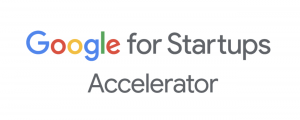
Martin Gonzalez And I’ll tell you. Like, that’s the one thing that has really driven a lot of this work, because it’s a lot of work to write a book and then to launch it. Like when I was done writing the book, I thought, great, this work is done, let’s move on with life. But no, no, launching the book is a whole different workstream and like what really drove us through all those tough days and I. This book was written like early in the morning. I would wake up at 4 a.m., write from 430 to 630, wake up the kids, get them to school, and then get to my to my work. And that’s how it was written over the course of, what, 18, almost 24 months? It was really that sense of mission of like if the few thousand founders, startup teams that have benefited from this have told us this is really useful. Like if we can get this book out there, it could really reach the hundreds of thousands or, you know, maybe the millions. And they might not know my name. They might like. And that happens all the time. Like a lot of the ideas in business, we never figured out how to who to attribute it to. But that’s fine. Like, for me, like, if this can be helpful, then let’s do it.
Bill Sherman And there’s a degree of impact and reach. And like you said, if an idea reaches the general business knowledge or a subset of that community. So entrepreneurship, for example, and becomes part of reflexive behavior where VCs are saying, hey, why aren’t you doing this? That’s a huge success on its own, right? And I want to talk about scale and the book, because you made some choices in writing this book and how it’s framed. Yeah, that I think are worth talking about. So when you describe the book as an open source tool, what do you mean?
Martin Gonzalez So what we do with the book is so the book is based on this workshop which we had brought to founders in 70 countries. We actually use the book to lay out what the workshop is, and very transparently share all the tools in that workshop with anyone who wants to run it themselves. Part of what inspired us to do this was, I remember distinctly after we had left Sao Paulo, and we had come back again the year after. We had all these founders come up to us and say, hey, you know, we’re I hope you don’t feel offended, but actually I took photos of your slides and we recreated this one thing in, in in your survey tool. We recreated it in Portuguese. And you know, I’ve so far I write it with five other five other times with other founders. And I thought, why would I ever be offended? And second, like, I should just help you do that. Well, and so the idea was to just open that, give it as generously as possible, you know, with the acknowledgment that, you know, one, it’s very rare for someone to have the, the, you know, the good fortune of being able to scale a program for founders across all these many countries. A lot of this rode on, you know, Google for startups really being the vehicle to do this. And two, it’s very much in Google’s ethos anyway, to give things out for free, as free as long as possible. Google search is free, YouTube is free, you know, so that kind of in that spirit, we wanted to do the same and get it to as many people as possible. Now, I am a firm believer that a rising tide lifts all boats. And so I don’t worry too much about, could we have made a better business if we had just, you know, you know, closed garden, this whole thing, like, possibly. But we were much more mission driven and cared more about the reach than we did about, you know, the anchor, thankfully. And for those who do optimize for income, like, there’s no shame in that. Like, you know, I’ve had the benefit of having, you know, a job at Google that I have really, you know, enjoyed doing. And so I continue to do that job while we kind of open source this work to the world.
Bill Sherman So the book in its structure, not only tells the story of the thought leadership and describes what you learned, but it’s also how to book for running the workshop, right?
Martin Gonzalez Which was it was a tricky choice to make. So it’s two parts. It’s half and half. Half. Here are all the lessons we’ve learned, and all the data and all the research we’ve done or have kind of leaned on. And then it’s this is the workshop. This is it’s a workshop in a box kind of a concept. And what we had to really do was to take something that I would facilitate or someone trained up to facilitate. And how do you put it in a package that people can just DIY? And we know that especially in the, in the startup ecosystem, they love to do it themselves. And so like how do we do in a big a big mentor of ours was Jake Knapp, who wrote the book sprints. And this is one of those ideas that has, you know, spread across, you know, the zeitgeist. But people don’t always attribute it back to him. But he’s the one who invented the idea of a design sprint. And today, like every product area, would always do us some kind of a design sprint. And so the idea was almost when we pitched it to the publisher, we said, this is a this is the book sprint, plus the book Radical Candor in one. And so we want to create like a sprint for leadership. That’s kind of the thought here.
Bill Sherman If you’re enjoying this episode of Leveraging Thought Leadership, please make sure to subscribe. If you’d like to help spread the word about our podcast, please leave a five-star review at ratethispodcast.com/ltl and share it with your friends. We’re available on Apple Podcasts and on all major listening apps, as well as thoughtleadershipleverage.com/podcasts.
Bill Sherman So let’s turn to you a little bit. Josh was pushing you to write the book and you eventually co-wrote it. Did you see yourself let’s go back, say ten, 12 years practicing thought leadership and writing a book and doing original research. Was that on the horizon and one of the targets for yourself?
Martin Gonzalez You know. So the honest answer is yes. I always thought, how cool would it be to write a book, to put a point of view out into the world. I remember one of the things one of the, the lighthouse for me was I think many of us got into this field kind of through psychometrics. So I, as a young, young high schooler, I somehow got really obsessed, a bit over obsessed with mBTI. In fact, I was I was making decisions on who to date and who to maybe break up with. Which of my girlfriends to break up with based on our mBTI. It was not healthy at some point.
Bill Sherman So I need you to take these battery of assessments including Five Factor, the Hogan Dark Side assessment. That and then based on that….
Martin Gonzalez Then, we can date. Yeah.
Bill Sherman: We can date. Yeah.
Martin Gonzalez Yeah that’s right, that’s right.
Bill Sherman Yeah.
Martin Gonzalez so short of asking that on the first date. Yeah, that’s essentially what we did. Maybe on the fifth date, I don’t know. And then and then I and then the thought of like, I could either be the person who gets certified to run this over and over again, or I could build the next mBTI. And kind of that second path appealed more to me because it felt like a real contribution to the world. And, look, people who facilitate and who bring important ideas to the, you know, two teams. I think that’s really important work. But I felt like I had the inclination to do the analytics and the curiosity to kind of and, and also a bit of this rebel energy, which I always had since I was a kid, to kind of do something fresh. And you.
Bill Sherman So you disclosed a love of psychometrics. But let’s talk about your background in education, because listening in someone would go, might go, oh, Martin is trained as an academic. Was that really your journey.
Martin Gonzalez Yeah. Well so. Well the first thing I should say is I have learned more about the upsides and downsides of psychometrics. So and part of it is through my academic journey I am not I am not a, I don’t have a PhD. I think in another life I probably had I known actually that this path existed, I would have maybe done it earlier in life and it was not too expensive to like, but where the opportunity cost of doing a PhD wasn’t yet so high.
Bill Sherman Well, there’s a cost in a time cost, right? I mean, you talked about writing this book at four in the morning. Yeah, working on a PhD at four in the morning is an entirely different level.
Martin Gonzalez So my academic background was I. So I started my career, did four years as a product person in Johnson and Johnson, and I had a chance to go back to school. My family, kind of my uncles all went and did. My uncles and aunts all did their MBAs. And that was a natural next step for me. My family believed very much in, you know, how education kind of levels the playing field for everyone. So MBA and somehow I thought that there was nothing more boring than sitting through a finance or accounting class, especially after having kind of done the product management work in consumer goods, where you feel like you’re the king of the hill, which is a whole different sidebar there. But so I thought at this time I was doing a lot of, just for fun, like I was I was with this youth group. I would kind of pick up leadership books and create these weekend seminars and, like, couldn’t knew if I was teaching the right or the wrong thing, but I would just speak out of those books, run, you know, run the fun workshop type events based on the ideas of that book of those books. And, and just loved it. I thought, what if I turned this into a career at that time? I grew up in the Philippines. There was no clear path on how one might do that. So it felt like a big bet. And my dad’s a CFO, at this point, and I’m like, dad, I want to do org psychology. Like, what do you think? You know, my dad’s like, he’s really as good as they come. Super supportive. But I could see kind of in his eyes, like, you want to do what it’s like. What? Like that’s not a real job. Go do finance or do something with business. So. So I go and, you know, I do my first master’s in in Columbia University in the field of psychology. And I loved it like every class mind blown. And just I think suddenly studying this stuff kind of blew my mind. And I thought, okay, I’m going to come back to academia and I’ll do a PhD one day. So five years later, after this program, I there’s a window of in my career where I’m like, okay, maybe now’s the time to really trigger this, this five year dream. And I study the possibility of doing a PhD, and somehow it’s just it just seems like too much time and money. And I say, okay, let me do a second Masters as a way to scratch the itch. So I do a, I do an executive masters in the London School of Economics in the field of behavioral science, because at the time it was really you kind of, you know, picking up a lot of interest. And I do the second master’s program while working full time. And I realize, oh man, that didn’t scratch the itch. Like, I still want to do a Ph.D., so. So and then I speak to Huggy Rao, who’s like a mentor to me. He’s a professor at Stanford. And I say, Huggy, I really want to do a Ph.D. I can’t seem to make it work. Like, what do you suggest of me? And he’s like, look, Martin. A PhD could ruin your life because it could rewire the way you think and all that. But if you’re really interested in research, just go do the research. I think that was such a pivotal moment for me to realize, okay, let me just do what I think Ph.D.s do, and kind of without investing the time and money to do the actual program and see where it goes. And kind of that’s been the guiding light for me. Look, I might one day call you up, Bill, and say, hey, I now have these fancy letters after my name, but I don’t know. I don’t know when that will happen.
Bill Sherman So, candidly, between you and I, I guess in a podcast recording, if it can be candid, I followed a similar path right where I was actually in my PhD program. Finished coursework and. Left. Right. Oh, wow.
Martin Gonzalez So it pains me to hear that.
Bill Sherman So I chosen fields that I enjoyed and loved that I realized they weren’t going to be the ones for my career. So I was doing I did study and work undergrad and grad in English Lit and in theater, and I thought I was going to be teaching at university. Right. And then the business bug hit and the organizational side hit and the cost of doing the course correction. At that point, when you’re studying for your comprehensive exams, you it was easier just to switch and then build the skills that I needed. And like you said, it is possible, if you can, the mind set on forming hypotheses. Fighting theory is for research, the willingness to do a literature review, as well as then to partner with others to construct a study right and analyze the data. Yeah. While a PhD teaches those things, if you’re in a network, you can be a practitioner that can draw in academics that help really tighten up the work. And that’s what I want to talk to you for a moment about is crossing over that practitioner academic divide? Yeah. How do you. Bring in the academics because you’ve alluded to a couple times. Yeah.
Martin Gonzalez Yeah. You know, I have I’ve learned that when academics look to I’ve been called once by a academic as an enlightened practitioner, as if practicable, but usually athletic. I can see what they mean. But, kind of someone who has an iron researcher has an eye on evidence-based advice giving, which, gosh, I wish was just more common in our field. But, you know, I’ve learned that they lean on enlightened practitioners for two things. One is data access, and to the instincts or the kind of to give a sense of what managers or what leaders care about or what’s relevant to the world. So the relevancy and the data access become really important. And I’ve learned that that, you know, if I can play a role in in doing that and then also just understand like research methods and be able to read an academic paper and then translate that to, you know, practitioner, you know, a managerial kind of environment. Then, then then you can be that real bridge, right? Where I have told academics multiple times of like, And so why again, is that useful to study or that is so relevant for these reasons. Can we need to bring this out there. Let’s experiment with ideas. And so I think, you know, I’ve had I’ve had professors tell me, look, I don’t have a real job. Martin, can you help me figure out like which of this is actually useful? And it becomes a really wonderful partnership when kind of I lean on them for the rigor and, really the thoughtfulness. And they lean on me and ask for, you know, relevance and data acts like it becomes a really wonderful pairing.
Bill Sherman And to build on that. I think the other piece is when in that conversation you identify a question to be asked. You have the access as a practitioner to go say, yeah, let’s go get a data set right and let’s go get a global data set like you said, hey, this workshop’s been run in 70 countries around the world. Yeah. You know. Yeah. On the other side of the house, the academics may be looking going. Well, we’ve got an incubator program at our university, and my other option is I work with students to create a measure, an assessment. You would have access to things that they don’t.
Martin Gonzalez Yeah, yeah. What does that term like this. They say that a lot of social science research is based on weird respondents. It’s Western educated can remember with AI and art and then democratic kind of are in democratic states. Yeah.
Bill Sherman Yeah. So you’re basically pulling a sub selection, you know, undergraduates basically who are doing this part of their psych. Well, that’s right or something. Right. And so yeah, that’s a little skewed. So. Before we begin to wrap up, I want to ask you one question, because we’ve been talking about data. We’ve been talking about turning this into a tool. But you created a validated measure. You built a framework from the workshop and then started identifying behaviors. What was that journey like?
Martin Gonzalez So first of all, I did not have the technical expertise to, you know, do a full on validation of, of a, of a survey tool. And so I leaned on, Meredith from the University of Southern California, who really helped through this process. And really, what it meant was first version of the tool was understanding, like, what’s the best way to even assemble a way to assess founders where we don’t really know yet what exactly needs to be. And so we best guess, based on, you know, conversations with a few academics and founders and people who mentor a lot of startups, asking them, like, what do you think are the traits and the behaviors of a good leader and in a startup environment? And so we pulled together a first version of that survey tool based on a best guess. And then over time, over years, we then collect. I think at that point when we started the validation process, we had about 936 degrees feedback surveys in our data set, which really translates to a few like hundreds of thousands of impressions on founders. And that’s where Meredith from USC comes in and helps us do the validation work to understand, okay, which of these items actually correlate with, you know, with our effectiveness measures. This was the first step. Do the clusterings all make sense? Because, again, we were sitting in all that data. And we realized through that, you know, the process of analytics, we also realized, well, if we put under a microscope the best and the worst in the data set, like what do we find? It then led us to publishing, really the first report of the Effective Founders Project, which we put out in 2022, through Google’s blog called Key Keyword. And that was like, you’re what we’ve discovered the best founders seem to be doing right. And that took interest that gained interest from, our publisher then kind of asked us to write up a full book. It also, there was interest also with, Valentina from white and then say, hey, you know, you’re correlating a lot of this with self-reported effectiveness, like, can we correlate this with actual market performance? And that’s where the collaboration with Wharton kind of came about then. Long story short, the paper isn’t out yet. We’re working through revisions. As we’ve said, it takes it takes years to get these peer reviewed papers out. But, but the answer is that when we look at the data, like, this tool actually correlates with things like, you know, ability to raise funds, the amount of, innovation activity, the likelihood that they will or the lower likelihood that they will close shop, the likelihood that they will go public. So, that’s been true.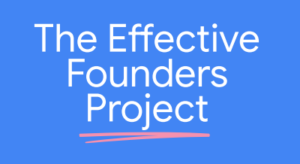
Bill Sherman And even with going public, then do they get a higher valuation on that too? Because that sort of becomes a compelling argument if you’re a VC going, oh, we get a higher multiple on our return. Yeah. Fantastic. So I want to call out a couple things here. One, the book is something that I want to call attention to The Bonfire Moment. And for the assessment, the self-assessments available online on the books website for free. Right.
Martin Gonzalez Yes. So people can go in, self-assess and then see how they do vis-a-vis the data set, of leaders around the world. And then there’s an option to go even deeper and then do the 360 degree feedback. We had to we had to charge for it, but we were trying to charge as minimally as possible, mostly because it costs money to build this. This this.
Bill Sherman Is a building of host, three six. Yeah. It’s just. Yeah, it’s different than a self assessment.
Martin Gonzalez Yeah. But people can then go in and do that, invite their peers, their direct reports, their, you know, investors or their superiors, and then give feedback on this and again, get benchmarked against the data set. So, yeah. So we hope people check it out and try it out.
Bill Sherman So Martin, I want to close by asking this question. You’ve been talking about reaching a scale with audiences around the world, and this course has been taught in 70 countries. You did some of the original data or the original workshop rollout, but you can’t do it all yourself. Yeah. How are you building a strategy to make this so that it is the norm for entrepreneurship? Where do you go from here?
Martin Gonzalez And, and that’s indeed the way we close the book is we say back when we built this workshop, it felt like the frontier. And our greatest hope is that this no longer is the frontier and that every startup team, every team that’s under startup like pressures. Understands the insights of this book and goes through this, you know, this process. So we wrote the book to be a standalone. Like you could actually pick up the book. Read it closely and then run the Bonfire Moment yourself. But if folks wanted to kind of feel more confident in running it, or they want to then run it for multiple larger groups, multiple startup teams, we’re looking to launch, a certification program, a little bit later on in the year, for people to then get trained up by myself and by Josh, in this, and so, you know, if there’s interest in that, our website also has a sign up forum so folks can signify interest. And we will bring the certification program to your neck of the woods once we have some amount of, like, critical mass. And the goal is to really go into every continent that startups find themselves in, which is, as far as I’ve checked, every continent except for Antarctica.
Bill Sherman So I think that there may have been 1 or 2 there, but I think the sample size is probably pretty small. So Martin, thank you for joining us today. Number two, I am glad that you’ve decided to get this research and the book out. I’m glad Josh encouraged you all those years ago, and may you have many more years in thought leadership without breaker.
Martin Gonzalez Thank you so much, Bill, I. It’s my aspiration to keep my hair as black as possible.
Bill Sherman Thanks, Martin.
Martin Gonzalez Take care, bill.
Bill Sherman Okay. You’ve made it to the end of the episode, and that means you’re probably someone deeply interested in thought leadership. Want to learn even more? Here are three recommendations. First, check out the back catalog of our podcast episodes. There are a lot of great conversations with people at the top of their game, and thought leadership, as well as just starting out. Second, subscribe to our newsletter that talks about the business of thought leadership. And finally, feel free to reach out to me. My day job is helping people with big insights. Take them to scale through the practice of thought leadership. Maybe you’re looking for strategy, or maybe you want to polish up your ideas or even create new products and offerings. I’d love to chat with you. Thanks for listening.


